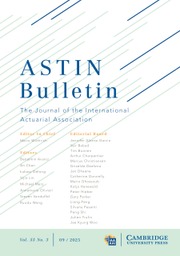Crossref Citations
This article has been cited by the following publications. This list is generated based on data provided by Crossref.
Albrecht, Peter
1991.
Kapitalmarkttheoretische Fundierung der Versicherung?.
Zeitschrift für die gesamte Versicherungswissenschaft,
Vol. 80,
Issue. 3-4,
p.
499.
Albrecht, Peter
1992.
Premium Calculation Without Arbitrage? A note on a contribution by G. Venter.
ASTIN Bulletin,
Vol. 22,
Issue. 2,
p.
247.
Wang, Shaun
1995.
Insurance pricing and increased limits ratemaking by proportional hazards transforms.
Insurance: Mathematics and Economics,
Vol. 17,
Issue. 1,
p.
43.
Wang, Shaun
1996.
Premium Calculation by Transforming the Layer Premium Density.
ASTIN Bulletin,
Vol. 26,
Issue. 1,
p.
71.
Wang, Shaun
1996.
Ordering of risks under PH-transforms.
Insurance: Mathematics and Economics,
Vol. 18,
Issue. 2,
p.
109.
Wang, Shaun S.
Young, Virginia R.
and
Panjer, Harry H.
1997.
Axiomatic characterization of insurance prices.
Insurance: Mathematics and Economics,
Vol. 21,
Issue. 2,
p.
173.
Gerchak, Yigal
and
Wang, Shaun
1997.
Liquid asset allocation using “newsvendor” models with convex shortage costs.
Insurance: Mathematics and Economics,
Vol. 20,
Issue. 1,
p.
17.
Wang, Shaun
1998.
An Actuarial Index of the Right-Tail Risk.
North American Actuarial Journal,
Vol. 2,
Issue. 2,
p.
88.
Young, Virginia R.
1998.
Families of update rules for non-additive measures: Applications in pricing risks.
Insurance: Mathematics and Economics,
Vol. 23,
Issue. 1,
p.
1.
Wang, Shaun S.
and
Young, Virginia R.
1998.
Risk-adjusted credibility premiums using distorted probabilities.
Scandinavian Actuarial Journal,
Vol. 1998,
Issue. 2,
p.
143.
Schmock, Uwe
1999.
Estimating the Value of the Wincat Coupons of the Winterthur Insurance Convertible Bond: A Study of the Model Risk.
ASTIN Bulletin,
Vol. 29,
Issue. 1,
p.
101.
EMBRECHTS, PAUL
2000.
Actuarial versus Financial Pricing of Insurance.
The Journal of Risk Finance,
Vol. 1,
Issue. 4,
p.
17.
Embrechts, Paul
Frey, Rüdiger
and
Furrer, Hansjörg
2001.
Stochastic Processes: Theory and Methods.
Vol. 19,
Issue. ,
p.
365.
Cardin, Marta
and
Ferretti, Paola
2001.
On the use of capacities in representing premium calculation principles.
Decisions in Economics and Finance,
Vol. 24,
Issue. 1,
p.
71.
Wang, Shaun S.
2002.
A Universal Framework for Pricing Financial and Insurance Risks.
ASTIN Bulletin,
Vol. 32,
Issue. 2,
p.
213.
Wang, Shaun S.
2003.
Equilibrium Pricing Transforms: New Results Using Buhlmann’s 1980 Economic Model.
ASTIN Bulletin,
Vol. 33,
Issue. 1,
p.
57.
Wang, Shaun S.
2003.
Equilibrium Pricing Transforms: New Results Using Buhlmann’s 1980 Economic Model.
ASTIN Bulletin,
Vol. 33,
Issue. 1,
p.
57.
O'Brien, Thomas J.
2004.
Asset Pricing of Insurance Loss Liabilities: Some Examples.
Financial Markets, Institutions & Instruments,
Vol. 13,
Issue. 4,
p.
147.
Young, Virginia R.
2004.
Encyclopedia of Actuarial Science.
Felice, Massimo De
and
Moriconi, Franco
2005.
Market Based Tools for Managing the Life Insurance Company.
ASTIN Bulletin,
Vol. 35,
Issue. 1,
p.
79.


